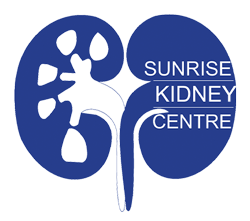Kidney Failure / Infections treatment in Vijayawada
Kidney failure, also known as renal failure, occurs when the kidneys lose their ability to effectively filter waste products and excess fluids from the blood, leading to dangerous levels of toxins accumulating in the body. This condition can develop suddenly (acute kidney failure) or gradually over time (chronic kidney disease). When they fail, symptoms such as swelling, fatigue, nausea, and decreased urine output may appear. Causes of kidney failure include diabetes, high blood pressure, infections, and certain medications or toxins. Treatment depends on the severity and underlying cause, often involving dialysis to artificially perform the kidneys' functions or, in severe cases, kidney transplantation. Early detection and management are crucial to kidney Failure treatment in Vijayawada which help to prevent irreversible damage and improve the quality of life for affected individuals.
Primary reasons for kidney failure

Kidney failure, also known as end-stage renal disease, can result from a variety of causes, often interconnected. Chronic conditions like diabetes mellitus and hypertension are the leading contributors, damaging the small blood vessels in the kidneys over time. Autoimmune diseases such as lupus can cause inflammation and destruction of kidney tissue. Kidney infection Treatment in Vijayawada also takes into account prolonged use of certain medications, including nonsteroidal anti-inflammatory drugs (NSAIDs) and some antibiotics, may impair kidney function. Infections like glomerulonephritis or pyelonephritis can cause irreversible kidney damage if untreated. Genetic disorders such as polycystic kidney disease lead to cyst formation and progressive loss of renal function. Obstructive uropathy from kidney stones or enlarged prostate blocks urine flow, causing back pressure and damage. Additionally, exposure to toxins, heavy metals, and dehydration can compromise kidney health. Often, a combination of these factors accelerates the decline in renal function, culminating in kidney failure.
Identifying kidney failure
Kidney failure can present with a range of symptoms that often develop gradually and may be mistaken for other conditions. Common signs include persistent fatigue and weakness, due to the buildup of toxins and anemia. Swelling in the legs, ankles, or feet occurs as the kidneys lose their ability to regulate fluid balance, leading to fluid retention. Changes in urination patterns, such as increased frequency, especially at night, or decreased output, are also indicative. Patients may experience foamy or bloody urine, reflecting protein or blood leakage. Other symptoms include shortness of breath from fluid buildup in the lungs, persistent nausea, and loss of appetite. Cognitive impairment, such as difficulty concentrating or confusion, can occur as waste products accumulate in the bloodstream. Additionally, skin appears dry, itchy, or pale due to anemia and toxin buildup. Recognizing these signs early is crucial for timely intervention by the best Doctor for Kidney Failure in Vijayawada to prevent progression to complete kidney failure.
Treatment options available
Treatment options for kidney failure primarily include dialysis, kidney transplantation, and supportive care. Dialysis, which can be hemodialysis or peritoneal dialysis, helps remove waste products and excess fluids when the kidneys can no longer perform these functions effectively. Hemodialysis involves filtering blood through a machine, usually three times a week, while peritoneal dialysis uses the lining of the abdomen as a natural filter, often performed daily at home. Kidney transplantation offers the best long-term solution, restoring kidney function through surgery and requiring lifelong immunosuppressant medication to prevent rejection. However, suitable donor organs are limited, and patients must undergo thorough evaluation. Supportive care under a nephrologist in Vijayawada focuses on managing symptoms and slowing disease progression, including controlling blood pressure, managing anemia, and reducing protein intake. Emerging treatments like regenerative medicine and bioartificial kidneys are under investigation, promising future alternatives for those with kidney failure.
Post treatment recovery
Recovery from kidney failure, whether acute or chronic, involves a multifaceted approach that emphasizes medical treatment, lifestyle modifications, and ongoing monitoring. In cases of acute kidney injury, prompt intervention with hydration, medication adjustments, and addressing underlying causes can restore kidney function. Chronic kidney disease management focuses on slowing progression through blood pressure control, diabetes management, and a kidney-friendly diet rich in low-sodium, low-potassium foods. Emerging therapies such as regenerative medicine and personalized medicine offer hope for future recovery prospects. Dialysis and transplantation remain critical options for those with advanced failure, but successful recovery hinges on early diagnosis, adherence to treatment plans, and regular medical follow-up. Psychological support also plays a vital role, helping patients cope with lifestyle changes and emotional stress. Dr. M.V. Sai Krishna one of the best Kidney Specialist in Vijayawada ensures that while full recovery may not always be possible, significant improvement in quality of life and kidney function is attainable with comprehensive care at Sunrise Kidney Centre, fostering hope and resilience for affected individuals.

